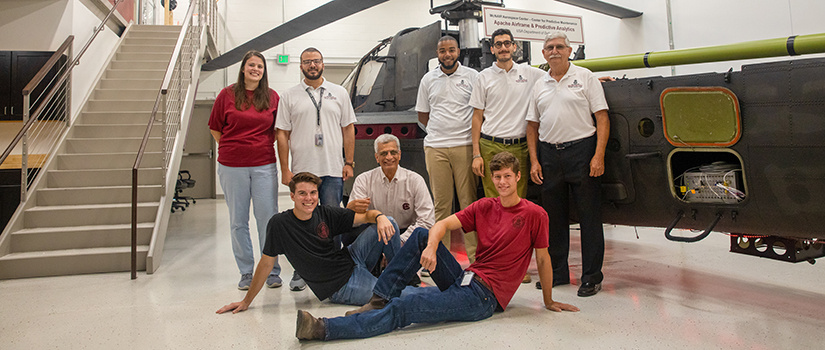Project to remove barriers of entry to the field of future vertical lift vehicles
The University of South Carolina is developing simulation tools and operational processes that will improve the affordability and safety of future vertical lift vehicles, also known as urban air mobility aircraft. As one of six research teams awarded a NASA University Leadership Initiative (ULI) grant, South Carolina will play an integral role in developing these aircraft of the future.
UofSC is partnering with the project’s lead university, Georgia Institute of Technology, through this three-year, $5.3 million grant. Alongside Georgia Tech’s expertise in kinematics and configuration, South Carolina’s expertise in advanced materials, digital transformation, and predictive maintenance will create a cost-effective working protype of a vertical lift aircraft. The hope is that one day, these vehicles will work like “air taxis” or “air ambulances” — decreasing urban congestion during rush hour or helping respond to emergencies, like hurricanes.
For our college to be awarded a NASA ULI in three consecutive years speaks to the world-class research being conducted in our college that is bringing about the future of aerospace.
- Hossein Haj-Hariri, Dean of UofSC College of Engineering and Computing
“This is adding another way of transportation,” says Abdel Bayoumi, the director of UofSC’s McNair Aerospace Center and South Carolina’s principal investigator on the project. “After this grant’s three years, we will have a working prototype that could be tested. Then it will go through beta testing, commercialization and so on. This will be when we are really starting to add more means for transportation.”
“With this, we are just hoping to allow more people to be in the urban vehicle field,” says Rhea Matthews, a research associate and co-PI at UofSC. “Whether it’s too expensive or too hard to maintain, we want to take away any barriers preventing entry into this field and allow more industries to access it.”
The UofSC team — featuring Bayoumi, Matthews and Paul Ziehl — will focus on sensing for cost-effective scheduling of maintenance for these vertical lift vehicles. This will include implementing a digital transformation framework for maintenance, developing specialized sensors and algorithms for in-flight monitoring and assessment, and creating optimal strategies for reliable data acquisition and processing. Ziehl, a co-PI on the project, says, “Only meaningful data can be collected and processed during flight to meet requirements for a very lightweight and low power decision-making system."
In addition, the team will look at the design, repair, and maintenance of advanced structures with industry partner Triumph Aerospace Structures Group. The team hopes these advancements will lead to better maintenance and repair of urban vertical lift vehicles, eventually leading to safer and more cost-effective use of these aircraft.
This is the third NASA ULI that South Carolina has received in the past three years. In 2019, David Matolak began working on a $4 million award to create safer and more efficient communications in aviation. In 2020, Michel van Tooren and Paul Ziehl were awarded a $5.7 million ULI to redefine the aircraft production process.
“For a university to receive one of these awards in a five-year stretch is an accomplishment in itself,” says Hossein Haj-Hariri, dean of the College of Engineering and Computing. “For our college to be awarded a NASA ULI in three consecutive years speaks to the world-class research being conducted in our college that is bringing about the future of aerospace. Pair that with three of our faculty members being elected to the National Academy of Engineering in the past three years, and you begin to understand the tremendous growth and success our college is experiencing.”
The University Leadership Initiative was created by the NASA Aeronautics Research Mission Directorate (ARMD). This ULI has six team leads, including the University of Texas-Austin, Pennsylvania State University, the University of California-San Diego, Purdue University, and the Georgia Institute of Technology. The ULI allows the universities to build their own teams and formulate their own research paths in hopes that their findings support the NASA ARMD portfolio and the larger U.S. aviation community.
